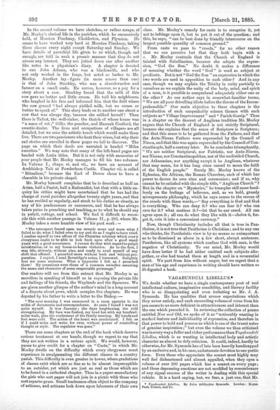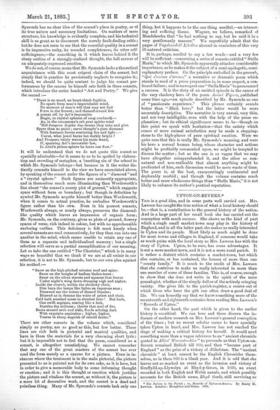VAGABITNDITLI LIBELLITS.*
WE doubt whether we have a single contemporary poet of real intellectual culture, imaginative sensibility, and literary facility who is so disappointing and even irritating as Mr. J. A. Symonds. He has qualities that arouse expectations which they never satisfy, and each succeeding volume of verse from his pen seems to us more deficient in attractiveness and interest than the one which preceded it. In reviewing the collection of poems entitled New and Old, we spoke of it as "noticeably wanting in marked feature and individuality of expression, and therefore in that power to hold and possess us which is one of the truest notes of genuine inspiration ;" but even the volume we thus criticised was in every way a fuller and richer performance than Vagabunduli Libellus, which is so wanting in intellectual body and, artistic character as almost to defy criticism. It could, indeed, hardly be otherwise, for Mr. Symonds has of late been heavily handicapped by an exclusive and, in his case, unfortunate devotion to one poetic form. Even those who appreciate the sonnet most highly may well feel disheartened and almost appalled, when they open a volume of over 200 pages which has a sonnet on every page ; and these depressing emotions are not modified by remembrance of any signal success of the writer in dealing with this special vehicle. It is a hard saying, but, we fear, a just one, that Mr.
Symonds has no clear idea of the sonnet's place in poetry, or of its true nature and necessary limitations. On matters of mere structure, his knowledge is evidently complete, and his technical skill is so great as to disconcert the merely fault-finding critic ; but he does not seem to see that the essential quality in a sonnet is its impressive unity, its rounded completeness, its utter self suffieingness,—the something in it which leaves behind it the sharp outline of a strongly-realised thought, the full savour of an adequately-expressed emotion.
We do not, of course, mean that Mr. Symonds lacks a theoretical acquaintance with this most exigent claim of the sonnet, but simply that in practice he persistently neglects to recognise it ; indeed, we should be quite content to judge his sonnet per formances by the canons he himself seta forth in three sonnets, which introduce the series headed "Art and Poetry." We give the second :— "There is no mood, no heart-throb fugitive, No spark from man's imperishable mind, No moment of man's will that may not find Form in the Sonnet; and thenceforward live A potent elf, by Art's imperative Magic, to crystal spheres of song confinedb As, in the moonstone's orb pent spirits wind 'Mid dungeon depths day-beams they take and give.
Spare thou no pains ; carve thought's pure diamond With fourteen facets scattering fire and light :— Uncut, what jewel burns but darkly bright ?
And Prospero vainly waves his ranio wand, If, spurning Art's inexorable law, In Ariers prison-sphere he leave one flaw."
it will be understood that we do not quote this sonnet as specially admirable—for it seems to us to be spoiled by elaboration and crowding of metaphor, a tesetting sin of the school to which Mr. Symonds belongs—but because in it the writer distinctly commits himself to the view we have enunciated above, by speaking of the sonnet under the figures of a " diamond" and a "crystal sphere." Such figures are eminently appropriate, and in themselves much more illuminating than Wordsworth's line about "the sonnet's scanty plot of ground," which suggests space without form or boundary ; but though in definition by symbol Mr. Symonds acquits himself better than Wordsworth, when it comes to actual practice, he embodies Wordsworth's figure rather than his own. Even in his poorest sonnets, Wordsworth always, or nearly always, preserves the diamond like quality which leaves an impression of organic form ; Mr. Symonds, on the contrary, gives us plots of ground, flowery
spaces of verse, rich indeed in colour, but with no apprehensible enclosing outline. This deficiency is felt most keenly when several sonnets are read consecutively, for they then run into one -another in the mind, which seems unable to retain any one of
them as a separate and individualised memory ; but a single selection will serve as a partial exemplification of our meaning.
Let us take the one entitled "The Chorister," which is in many ways so beautiful that we think if we are at all unfair in our selection, it is not to Mr. Symonds, but to our own plea against his method:— " Snow on the high.pitched minder roof and spire : Snow on the boughs of leafless linden-trees : Snow on the silent streets and squares that freeze Under night's wing down-drooping nigh and nigher.
Inside the church, within the shadowy choir, Dim barn the lamps like lights on vaporous seas ; Drowned are the voices of droned litanies ; Blurred as in dreams the voice of priest and choir.
Cold bath numbed sense to slumber here ! But hark, One swift soprano, soaring like a lark, Startles the stillness; throbs that soul of fire, Beats around arch and aisle, floods echoing dark With exquisite aspiration ; higher, higher, Yearns in sharp anguish of untold desire."
There are other sonnets in the volume which, considered simply as poetry, are as good as this, but few better. These lines are rich both in pictorial and musical qualities, and have in them the materials for a very charming short lyric ; but it is impossible not to feel that the poem, considered as a sonnet, is altogether unsatisfying. We cannot remember that any one of the great masters of the sonnet has ever used the form merely as a canvas for a picture. Even in instances where the treatment is in the main pictorial, the picture
presented to us is painted not for its own sake, as it is here, but in order to give a memorable body to some informing thought
or emotion; and it is this thought or emotion which justifies the picture and vitalises the sonnet, as without it, the picture is a mere bit of decorative work, and the sonnet is a dead and pointless thing. Many of Mr. Symonds's sonnets lack only one
thing, but it happens to be the one thing needful,—an interesting and sufficing theme. Wagner, we believe, remarked of Mendelssohn that "he had nothing to say, but he said it in a very gentlemanly manner." We regretfully admit that the pages of Vagabuncluli Libellus abound in reminders of this very ill-natured criticism.
It is, perhaps, needful to say a few words—and a very few will be sufficient—concerning a series of sonnets entitled" Stella Maria," to which Mr. Symonds apparently attaches considerable importance, as he makes it the subject of a semi-apologetic, semiexplanatory preface. On the principle embodied in the proverb, "Qui s'excuse s'accuse," a narrative or dramatic poem which stands in need of a prose preparation is, in some respect, a confessed failure ; and in no respect can" Stella Maria" be pronounced a success. It is the story of an omitted episode in the career of the very shadowy hero of the poem Animi Figura, published some time ago,—an episode described by Mr. Symonds as one of "passionate experience." This phrase certainly sounds better than "illicit love ;" but the latter would be more accurately descriptive. The narrative is very unreal, very thin, and not very intelligible, even with the help of the prose explanation ; but its ethical significance seems to be—though on this point we speak with hesitation—that the satiety which comes of mere animal satisfaction may be made a steppingstone to the high-places of pure spiritual emotion. Were we quite sure that this is really Mr. Symonds's meaning, and were his hero a normal human being, whose character and actions might be profitably commented upon, we might be tempted to discuss the matter ; but as the one is so vague that we may have altogether misapprehended it, and the other so nonnatural and non-realisable that almost anything might be predicated of him, such discussion would be mere waste of time. The poem is, at the best, exasperatingly sentimental and deplorably morbid ; and though the volume contains much better and more wholesome things than "Stella Maria," it is not likely to enhance its author's poetical reputation.



































 Previous page
Previous page